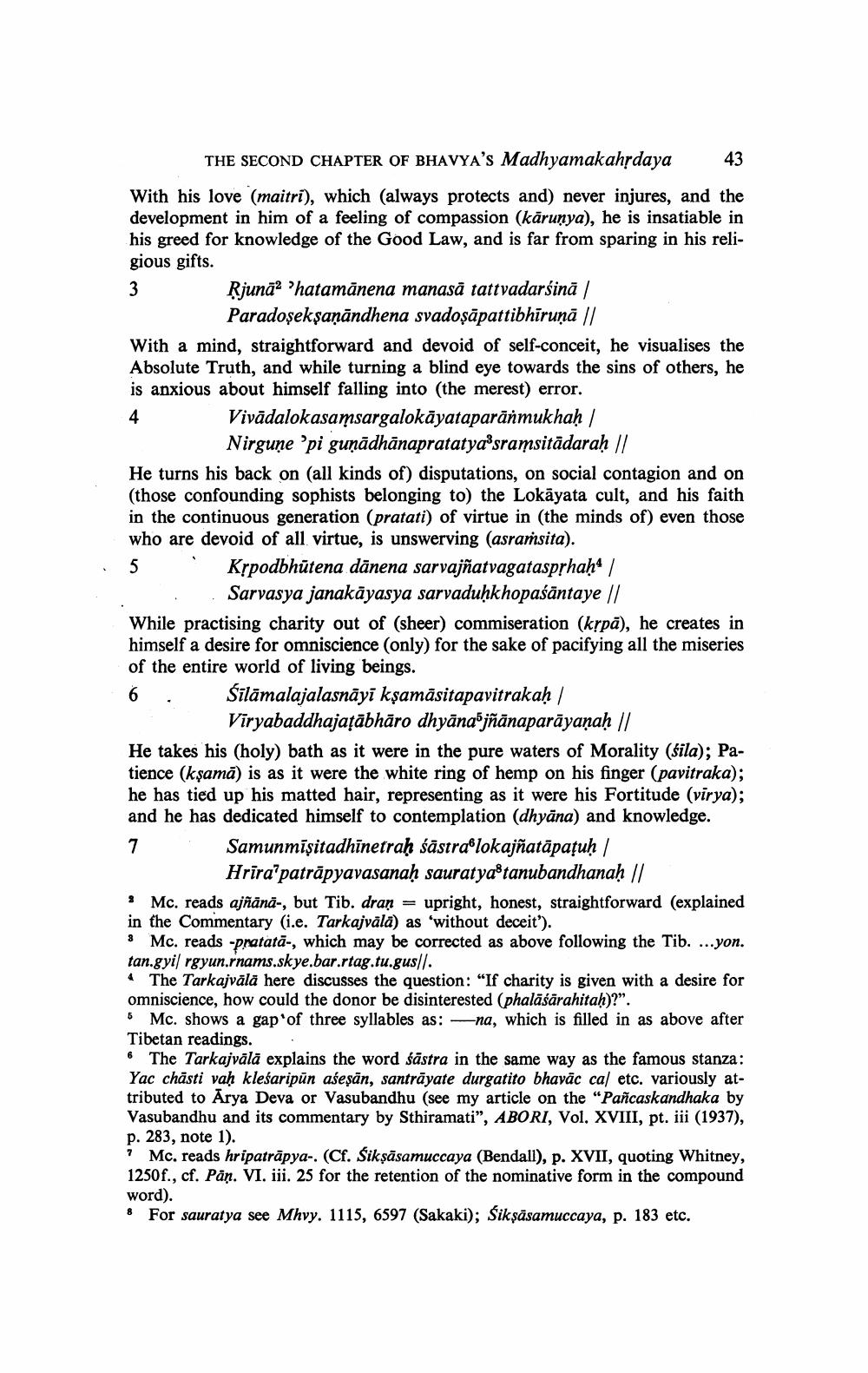Book Title: Second Chapter Of Bhavyas Madhyamakahrdaya Author(s): V V Gokhale Publisher: V V Gokhale View full book textPage 4
________________ THE SECOND CHAPTER OF BHAVYA'S Madhyamakahrdaya suga 43 With his love (maitri), which (always protects and) never injures, and the development in him of a feeling of compassion (kārunya), he is insatiable in his greed for knowledge of the Good Law, and is far from sparing in his religious gifts. Rjunā'hatamānena manasā tattvadarśinā / Paradoșeksaņāndhena svadoșāpattibhīruņā // With a mind, straightforward and devoid of self-conceit, he visualises the Absolute Truth, and while turning a blind eye towards the sins of others, he is anxious about himself falling into the merest) error. Vivādalokasamsargalokāyataparārmukhaḥ / Nirgune 'pi guņādhānapratatya’sramsitādaraḥ // He turns his back on (all kinds of) disputations, on social contagion and on (those confounding sophists belonging to) the Lokāyata cult, and his faith in the continuous generation (pratati) of virtue in (the minds of) even those who are devoid of all virtue, is unswerving (asramsita). 5 . Krpodbhūtena dānena sarvajñatvagataspshah" / Sarvasya janakāyasya sarvaduḥkhopaśāntaye // While practising charity out of (sheer) commiseration (krpā), he creates in himself a desire for omniscience (only) for the sake of pacifying all the miseries of the entire world of living beings. 6 . Šīlāmalajalasnāyī kşamāsitapavitrakaḥ / Viryabaddhajațābhāro dhyāna'jñānaparāyaṇaḥ || He takes his (holy) bath as it were in the pure waters of Morality (sila); Patience (kşamā) is as it were the white ring of hemp on his finger (pavitraka); he has tied up his matted hair, representing as it were his Fortitude (virya); and he has dedicated himself to contemplation (dhyāna) and knowledge. Samunmīşitadhinetrah śāstra lokajñatāpatuh / Hrira'patrāpyavasanaḥ sauratya$tanubandhanaḥ // · Mc. reads ajñānā-, but Tib. dran = upright, honest, straightforward (explained in the Commentary (i.e. Tarkajvälä) as 'without deceit'). 8 Mc. reads -pratatā-, which may be corrected as above following the Tib. ...yon. tan.gyil rgyun.rnams.skye.bar.rtag.tu.gus//. 4 The Tarkajvālā here discusses the question: "If charity is given with a desire for omniscience, how could the donor be disinterested (phalāśārahitah)?". 5 Mc. shows a gap of three syllables as: -na, which is filled in as above after Tibetan readings. 6 The Tarkajvālā explains the word śāstra in the same way as the famous stanza: Yac chāsti vaḥ klesaripūn aśeşān, santrāyate durgatito bhavāc cal etc. variously attributed to Arya Deva or Vasubandhu (see my article on the "Pancaskandhaka by Vasubandhu and its commentary by Sthiramati", ABORI, Vol. XVIII, pt. iii (1937), p. 283, note 1). ? Mc, reads hripatrāpya-. (Cf. Śikṣāsamuccaya (Bendall), p. XVII, quoting Whitney, 1250f., cf. Pan. VI. iii. 25 for the retention of the nominative form in the compound word). 8 For sauratya see Mhvy. 1115, 6597 (Sakaki); Śikṣāsamuccaya, p. 183 etc.Page Navigation
1 2 3 4 5 6
